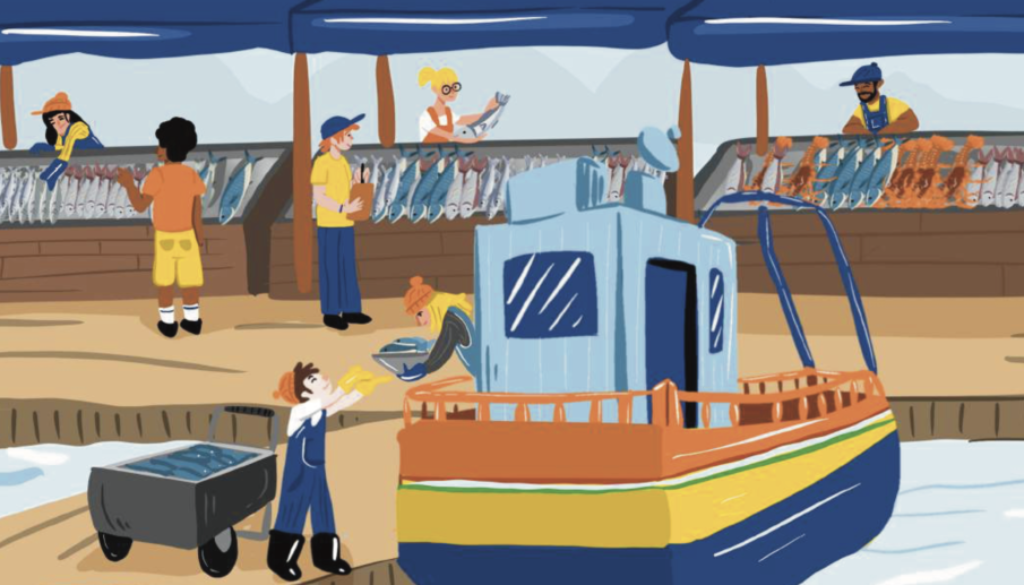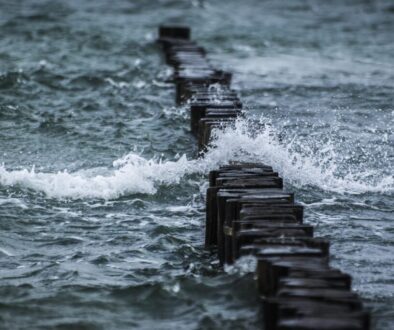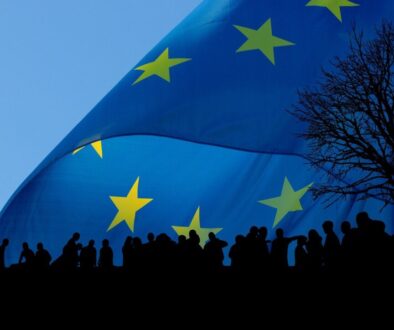One of the problems facing the small-scale fishing sector is a lack of dedicated representation in the official bodies of the profession. This is particularly the case in France where small-scale fishers are struggling to unite to defend their interests. For Bertrand Cazalet, Secretary and Legal Adviser of the Syndicat professionnel des pêcheurs petits métiers d’Occitanie (SPMO – Professional Union of Small Scale Fishers of Occitania), Fisheries Producers’ Organisations (FPOs) provide a tool that European small-scale fishers would do well to invest to secure their future, and particularly so in the Mediterranean to better defend their traditional management methods based on polyvalence and strong territorial linkages. Interview.
This interview was conducted by LIFE as part of the Foodnected project and originally published on the Foodnected website.
What is a Fishery Producer Organisation? What role do FPOs play in the EU?
A Producer Organisation (PO) is a specific European tool created within the framework of common European policies, first the Common Agricultural Policy (CAP), then the Common Fisheries Policy (CFP). POs bring together producers (fishers, farmers, etc.) in a given area, often in cooperatives, but also as other organizational and legal structures.
The recognition of a PO is done at national level through a process overseen by the EU. FPOs are seen as key to achieving the objectives of the CFP, and the management of their production and marketing activities is delegated to them:
– Production: includes the general organisation of fishing activities, the allocation, management and monitoring of catch quotas and fishing effort, the management of licences, elaboration and implementation of internal rules, the control and sanction of FPO members;
– Marketing: includes the organisation of the first sale (in conjunction with fish auctions and port markets), the improvement and monitoring of traceability and the application of sanitary measures, and the implementation of initiatives to enhance the value of the products throughout the value chain.
Each PO must produce an annual or multi-annual production and marketing plan that determines all the elements necessary for the PO to achieve its objectives under the conditions defined by the European regulations.
Are Mediterranean small-scale fishers represented in the POs? Are there any POs specific to small-scale fishing in the region?
When we talk about small-scale fishing, we are talking about relatively small boats using passive or non-towed gears. In France small-scale fishing is synonymous with “petits métiers”, and in Spain “artes menores”. For the European Commission, small-scale fishing is carried out by fishing vessels of an overall length of less than 12 metres and not using towed fishing gear.
There are a few examples of POs dedicated to small-scale fishing in Europe[1] but no specific PO for small-scale polyvalent fishing exists in the Mediterranean. In France, POs are either composed of industrial fisheries only or are mixed POs with different fleet segments represented. However, even the latter were originally created and controlled by larger fishing companies. In both cases it is very difficult for small-scale fishers to have their interests recognised and defended. In the Mediterranean more than 80% of small-scale fishers do not belong to POs. This is due to historical reasons and to the Mediterranean fisheries management system, where fishing access is not based primarily on licensing and quotas.
And what is the situation outside the POs in the Mediterranean today?
Small-scale fishers in the Mediterranean are mainly individual skippers whose activities are seasonally polyvalent and carried out close to shore. With 80% of them not associated into POs, they are undermined by 1) the weakening of the Prud’homies (traditional community-based management structures specific to the French Mediterranean), some of which no longer function at all; 2) the difficulties faced by some Fisheries Committees, particularly at departmental level, which are struggling to maintain their capacity to represent and act for their members; 3) the reduction in the means available to the State and its administration, which is tending to increasingly delegate the management, monitoring and control of fishing activities to POs.
Similarly, there is increasing political and professional pressure on fishers outside POs to join existing POs: they are informed that they will have fewer rights, that they will lose their track records, their licences, that they will not be entitled to European funds. This is absolutely false from a purely legal point of view because there can be no discrimination in the rules of access to fishery resources and financial support. The French State also recognises that it needs to rebalance the system of fishing rights that is very largely favourable to POs, but which, given that fisheries resources are a public good, is questionable from an equity perspective[2].
The organisation “Golion” has initiated a process to be recognised as a PO: why?
Golion has been operating officially on behalf of a group of small-scale Mediterranean fishers (“petits métiers”) for 10 years, with a structure (GIE) recognised by ministerial decree to manage species subject to quota (bluefin tuna and swordfish). The structure is associated with a professional union but it is limited in its scope (bluefin tuna and swordfish), in its powers to manage fishing rights (licences), and in its duration (because its structure must be renewed every three years).
To get out of this legal insecurity and to act across all the small-scale fisheries, we decided to initiate a process to recognise the association Golion as a PO. Launched in 2014, Golion is the owner of a group “own-label” under which the products of its members are marketed. As Golion’s structure includes an economic dimension, it meets the necessary pre-conditions to launch a PO process, a process that was initiated without any form of public or private financial support.
What do you expect from getting Golion recognised as a PO?
The advantage of being recognised as a PO is first of all institutional, as it allows you to organise yourself better, to be better represented and supported (administratively, technically and financially) and therefore, in the end, to better defend your rights. Faced with the growing demands of the CFP and its management rules, we, as POs, would have a structure that would give us official weight as well as the right to be heard by the authorities and the administration. It is also a way to assure our organisation’s future as an officially approved organisation.
Small-scale fishing is going to face increasing pressures on its fishing areas, including due to the conditions imposed by the Western Mediterranean (West Med) plan and the implications for trawlers,[3] resulting notably in a transfer of fishing effort towards the coast. European regulations as a whole will continue to be tightened and the most fragile fleet segments will be the first to disappear. The “petits métiers” will not be able to overcome the constraints and costs imposed by monitoring, control and surveillance rules, unless they manage to unite. In the French Mediterranean, there are still 1,000 small-scale vessels outside POs, a fact that fully justifies the recognition of a dedicated small-scale fishing PO. Such an initiative is also in line with France’s commitments to the regional fisheries body – the GFCM (General Fisheries Commission for the Mediterranean) – and the Regional Plan of Action for Small Scale Fisheries (RPOA SSF) the GFCM adopted in 2018.
What other benefits could the creation of a small-scale PO have for the fishers themselves and for fishing in general?
Within the PO, we want to defend our Mediterranean management methods, which adopt an approach not by species but by territory, the use of polyvalent techniques and seasonal diversity. In this type of management, the rules are established according to the context, the areas and the local practices. These are in fact the management principles of the Prud’homies, age-old bodies that are not recognised either at state or European level. These bodies could be revitalised and re-legitimised through being associated in a small-scale fisheries PO.[4]
Small-scale polyvalent fishing is generally a headache for managers and scientists, who find it easier to model a specialised, monospecific system of catch quotas or effort per boat. We are often criticised for a lack of monitoring of small-scale fishing effort: with a dedicated small-scale PO, we could document fishing operations, process catch, effort and commercial data, support the fishers and better integrate them into the monitoring systems. Only a dedicated small-scale PO would be able to do this, as the existing POs in the Mediterranean could not offer the thousand or so non-PO associated vessels such a framework that is geared solely towards the great diversity of the practices and characteristics of small-scale fishing.
What is the procedure for creating a PO? Are there any particular conditions to be met?
You need to have an already established economic structure of producers, such as our economic interest grouping (GIE), and to prove its representativity, particularly in terms of the volumes and value of catches, or in terms of the number of vessels. Our application is based mainly on the criteria of the number of vessels (85% of small vessels in the Mediterranean) and on the value of production rather than on volumes produced. We have put together an application that meets the requirements of the French state for the recognition of POs. Ours is more than 70 pages long and includes the statutes, the internal regulations, the presentation pack, the production and marketing plan, the data of all the fishers (licences, catches), etc. It must then be submitted to the DIRM (Mediterranean Regional Authorities), which is the branch of the French administration that examines applications at the Mediterranean level. It then formulates an opinion, which it sends to the DPMA (Department of Marine Fisheries and Aquaculture), the national level administration on fisheries and maritime affairs, which takes the final decision.
And have you managed to mobilise the fishers around the need to create a small-scale fishing organisation?
This is the main difficulty we face. We have only our very limited means to achieve our goal and no form of public aid. As mentioned above, our representativity will not be evaluated on the volume of catches because we have few landings and quotas, but on the number of boats. What makes us special is that we represent many boats in one area, the French Mediterranean. In our initial file submitted to the DIRM, we have 112 boats, which would make us the leading French Mediterranean PO in terms of the number of small-scale vessels. But this is not enough, we need to reach 150 vessels to fully meet the recognition criteria. We therefore need to attract new members and to do this we need to mobilise people in the ports, in the Prud’homies, etc. Our lack of means gives us a long-term disadvantage.
Are you confident about the future?
I’m fairly confident because we meet the criteria, and I don’t see any legal or technical obstacles to our application. I also think that the administration has understood that there is a professional interest in structuring the “petits métiers” in a PO. There are going to be fewer and fewer resources and more and more constraints, so anything that can encourage the autonomy and capacity of the fishers is a good strategy to have with the administration. Finally, I am hopeful that the professional representatives will in turn become aware of the basic need to structure the “petits métiers” into POs. With the forthcoming elections in the Fisheries Committees (which also represent the “petits métiers”), we could garner a more favourable interest for our project and establish some concrete collaborations to enable us to quickly finalise this vital process for the “petits métiers”.
To find out more, click here:
Report
Cazalet, B and O’Riordan, B. 2020. ” The Pros and Cons of Creating Producer Organisations (PO) for Mediterranean Small-Scale Fishers” Low Impact Fishers of Europe. 41 pages.
https://lifeplatform.eu/wp-content/uploads/2021/06/LIFE-Producer-Organisations-PO-Guidelines-EN.pdf
Online article:
[1] The “Organizacion de Productores Artesanales de la Lonja de Conil” in CONIL de la Frontera in Andalusia (Spain), which brings together around 50 artisanal fishing boats using passive gears (“artes menores”); FSK (Low Impact Inshore Fishing PO), one of LIFE’s members in Denmark, a PO which brings together 45 vessels belonging to a number of inshore fishing associations; and the PO Estuaire in France, which is a single-species PO and is solely dedicated to managing the elver (juvenile eel) fishery activity. See in: Cazalet, B and O’Riordan, B. 2020. ” The Pros and Cons of Creating Producer Organisations (PO) for Mediterranean Small-Scale Fishers” Low Impact Fishers of Europe. 41 pages
[2] The new government action plan presented in March 2022, although very general, plans to “encourage technical support for small businesses by reforming the rules for distributing quotas”, including “increased attention to the production outside POs”. https://mer.gouv.fr/sites/default/files/2022-03/Plan-action-peche-durable_DP.pdf
[3] European management plan within the CFP which envisages a 40% reduction in fishing effort over five years (2021-2025) in a defined area of the Western Mediterranean.
[4] Prud’homies date back to the Middle Ages, they have been listed as part of France’s intangible heritage since 2021 and a process of classification as part of UNESCO’s intangible heritage is underway.




